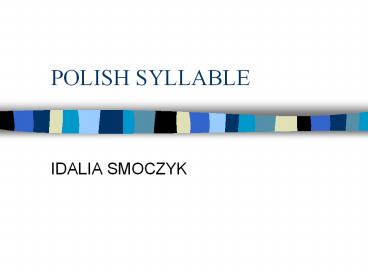POLISH SYLLABLE - PowerPoint PPT Presentation
Title:
POLISH SYLLABLE
Description:
THE INTERNAL STRUCTURE OF THE ONSETS OF POLISH SYLLABLES ... F - fricative ( f,v,s,z...) T - stop (g,k,d.t,p,b...) OTHER COMBINATIONS ARE ALSO POSSIBLE ... – PowerPoint PPT presentation
Number of Views:192
Avg rating:3.0/5.0
Title: POLISH SYLLABLE
1
POLISH SYLLABLE
- IDALIA SMOCZYK
2
Outline
- VARIOUS DEFINITIONS OF A SYLLABLE
- SYLLABLES CAN BE DIVIDED INTO
- AMBIGUITY OF DIVISIONS
- PHONOLOGICAL MODEL OF POLISH SYLLABLE
- THE INTERNAL STRUCTURE OF THE ONSETS OF POLISH
SYLLABLES - ANALYSIS OF THE POLISH SYLLABLE - PROBLEMS
- REPRESENTATIONS OF SYLLABLES
3
VARIOUS DEFINITIONS OF A SYLLABLE
- a rhythmical part of a word which usually
contains one vowel - the smallest independent phonetic unit
- a segment of speech between two declines of
sonority with a clearly marked peak of sonority - a unit in which in a given language phonemes are
combined according to particular rules
sonority
sounds
d o m
4
TYPES OF SYLLABLES
- OPEN SYLLABLES
- ending with a vowel, eg. za-ba-wa, o-glo-sze-nie
- CLOSED SYLLABLES
- ending with a consonant or a cluster of
consonants, eg. staw, pod-recz-nik
5
AMBIGUITY OF SYLLABLE DIVISIONS
- The division of a word into syllables may be
ambiguous. Consonantal clusters inside a word can
be split in different ways. Two or more different
divisions are usually possible! - e.g.
6
PHONOLOGICAL MODEL OF POLISH SYLLABLE
- In Polish only the opposition between a
consonant and a vowel is relevant! - ( C ) V ( C )
- - the element of the type C can occur many
times - ( ) - C is optional
- V - an obligatory element
7
PARTICULARITIES OF POLISH PHONOTACTICS
- In Polish syllable there can be up to 5
consonants at the beginning and at the end of the
syllable, eg - nastepstw / nastempstf /
- Strwiaz / strfj NS /
- In comparison to other European languages, in
Polish the QUANTITY, LENGTH and FREQUENCY of
occurrence of consonantal groups is the HIGHEST
c
8
THE INTERNAL STRUCTURE OF THE ONSETS OF POLISH
SYLLABLES
- the most frequent combinations of consonants
- OS-, FT-, FTS-
- O - obstruent (b,p, f,v,ts,dz,d,t...)
- S - sonorant (m,n,l,j,r )
- F - fricative ( f,v,s,z...)
- T - stop (g,k,d.t,p,b...)
9
OTHER COMBINATIONS ARE ALSO POSSIBLE
- even combinations of the type SO- (as opposed
to many other European languages) - eg lze, lsni, mgla
- and combinations of the type OSO-
- eg krwawy, trwoga, plwac, plciowy
10
RESTRICTIONS ON INTERNAL STRUCTURE OF POLISH
SYLLABLE
- groups of 2 obstruents must be homogenous as far
as voicing is concerned, eg zhardziec, dwa - /j/ can occur only in the immediate neighbourhood
of a vowel, - eg jawa
- groups /rl/, /lr/ do NOT occur in Polish onsets
- /n/ and /n/ do NOT occur in OSO-
- the combinations of a nasal sonorant a stop of
the same place of articulation (eg. /nd/, /mb/)
do NOT occur in Polish onsets
11
METHODOLOGICAL ASPECTS OF THE STUDY
- no research concerning all possible combinations
of consonants and vowels in the Polish syllable
is known - the analysis made on the basis of 240 words (out
of 20.000) occurring most frequently on WWW pages
on the Internet. Therefore, the study does not
fully reflect reality - only onsets of Polish syllables analysed
12
Tree representation of Polish CCCCV onsets
krwiak from to through 1 22 k 22 33 r
33 43 f 43 51 j 51 6 a
skrwawiony from to through 1 21 s 21
32 k 32 42 r 42 51 f 51 6 a
wstrzas from to through 1 23 f 23 34
s 34 44 t 44 21 S 52 6 o
40
w
b
dz'
wspierac from to through 1 23 f 23 34
s 34 45 p 45 53 j 53 6 e
30
f
41
r
20
50
o
z'
t
31
s
f
a
42
zdzblo from to through 1 20 z 20 30
dz 30 40 b 40 50 w 50 6 o
r
51
21
k
6
1
32
j
strwozony from to through 1 21 s 21 3
1 t 31 41 r 41 50 f 50 6 o
k
o
f
22
r
43
52
33
f
e
S
t
s
53
23
44
34
p
j
45































